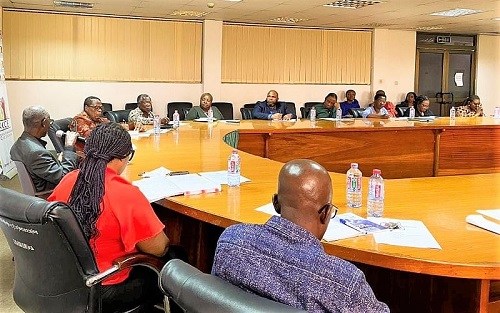A Deputy Chair in charge of Operations, National Commission for Civic Education (NCCE), Samuel Asare Akuamoah, has charged African leaders to critically examine their reigns to help minimise occurrence of coup d’états on the continent.
That, he said, was also necessary to understand the root causes of the rampant coup d’états on the continent, identify the justifications to find solutions to them.
Mr Akuamoah made the call in an interview with the Ghana News Agency, after the Commission received an eight-member Delegation from the Namibian African Peer Review Mechanism (APRM), in Accra.
The delegation was led by Lineekela J. Mboti, Chief Executive Officer, Namibian APRM.
The purpose of the visit was to understudy how the NCCE discharged its civic education mandate.
At least, four democratically elected governments including Mali, Burkina Faso and Guinea, have been toppled by military juntas since 2021, with the latest one happening in Niger.
On July 26, 2023, presidential guards ousted the elected President Mohamed Bazoum, suspended the country’s constitution, and installed General Abdourahmane Tchiani as Head of State.
Mr Akuamoah said it was extremely sad that the continent continued to witness coups after years of efforts to promote democratic principles in Africa.
“We have encountered coups in the sub-region and at the point that we think that we have closed the chapter on one, and another one happens again,” he said.
The latest coup, he said, was “an opportunity for us to also do a self-introspection to ask ourselves about the causes and to see the justifications and make sure that we address them, we take the bull by the horn.
“Our people cannot compromise on their mandates, that is critical. And so, how do we cede the mandate of the people to government and when we get the mandate, how do we account for the mandate?
“I’m sure if we are able to account for the mandate that we are given, it will tone down the challenges that confront us,” he added.
Mr Akuamoah, who is also a member of the Governing Board of the APRM, urged calm among the warring factions as well as regional blocks, including the Economic Community of West African States (ECOWAS) and the African Union, to avoid a spillover of the conflict.
“We should apply cool heads to the solution and ensure that democracy predominates, we shouldn’t allow what is happening in Niger to have a spillover effect,” Mr Akuamoah said.
He also indicated that Ghana was concerned about activities of violent extremist groups within the subregion which have destabilised nations.
As a result, he said, the country was currently implementing a number of projects to educate community members about the presence of such terrorist groups to curtail any possible attack.
“We are at the crossroads, but we know that the kind of resilience that we have built over the years is going to carry us through,” Mr Akuamoah added.
Mr Mboti, the leader of the Namibian Delegation, urged democratically elected African leaders to improve governance on the continent to curtail the coup d’états.
He said it was regrettable that Africa had failed to “silence the gun” by the set date of 2020, urging other African countries to ensure that the situation in West Africa did not become a “model for the rest of the continent.
“In that regard, it’s going to be unfortunate, uncalled for. At the end of the day, it’s women and children that suffer and we have gone through that, and we do not want to go back,” he added.
GNA





